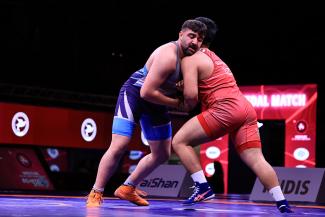UWW promotes clean-up, turtle preservation at beach wrestling
Monday, June 13, 2022 - 10:20 By United World Wrestling Press

CORSIER-SUR-VEVEY, Switzerland (June 13) -- United World Wrestling hosted the first stop of the Beach Wrestling World Series in Sarigerme, Turkey last month. Apart from focusing on bringing beach wrestling to the mainstream, UWW implemented actions and activities to raise awareness about the environment while reducing its impact during major events since 2018.
For the first stop, UWW put three goals in focus in Turkey. It worked on donations and spreading a message to treat turtles, clean up the beach during and after the competition and help the region replant trees that were destroyed by the 2021 wildfires in Turkey.
The international body for wrestling signed the UNCCC framework and adopted the Sport Climate Action Plan in 2019.
"I think it's wonderful that during the world series, the community is paying attention to global issues," Nese GUNDOGAN, Turkey NOC Secretary-General, said. “Cleaning the beach and planting trees is a great initiative that aligns well with the discipline”.
UWW's initiative to help save turtles was inspired by the people who were already working hard to preserve the animal by involving all stakeholders in the situation of Caretta caretta, the loggerhead sea turtles, and their eco-system.
The project is to bring officials for a tour of the sea and try to understand better how this Caretta is living there. A visit to the hospital where the turtles are treated and brought back to water is also undertaken.
Last year, Turkey faced massive wildfires including Sarigerme. The local community and authorities have already established a replantation program for the burnt forest. UWW began an initiative to raise awareness of climate change matters. The national teams and officials joined the 'replant trees day'.
 A tree plantation drive was also conducted in Sarigerme. (Photo: United World Wrestling)
A tree plantation drive was also conducted in Sarigerme. (Photo: United World Wrestling)
The Beach Clean initiative began in Sarigerme but will be replicated at all the stops of the world series in 2022. All delegations will take part in the initiative in collaboration with the local community.
At the first stop, reusable water bottles were given to the participants with the objective to stop the use of plastic bottles. The trend will continue at the remaining stops including the finals.
For beach wrestling action, please check out beachwrestling.org as the second stop is live from Sanxenxo, Spain on June18-19.


Share your thoughts.
Comments